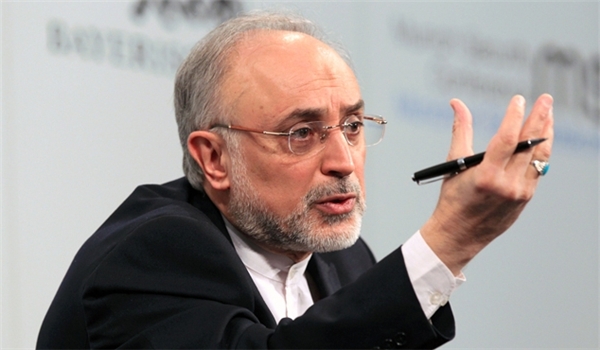Russian yellow cake cargo is in Iran and Iran’s enriched uranium cargo will be sent to Russia in coming days as envisaged in the nuclear deal between Tehran and the world powers, Head of the Atomic Energy Organization of Iran (AEOI) Ali Akbar Salehi announced on Wednesday.
Based on the nuclear deal, Iran’s enriched uranium which was 9 tons will be given to the Russians and we will receive yellow cake instead, Salehi told reporters in Tehran on Wednesday.
“The yellow cake cargo has been imported and is in Isfahan (now) and Iran’s enriched uranium will be loaded into a Russian ship in coming days and will be delivered to that country,” he added.
President Hassan Rouhani announced in August that Iran would commercialize nuclear technology as soon as the nuclear agreement comes into practice.
“Our nuclear program has been recognized in the Resolution 2231 and world powers are eager to cooperate with us in this regard,” Rouhani told reporters.
The president added that the Islamic Republic plans to export enriched UF6 and import yellow cake from abroad.
His remarks came after Iran and the world powers reached a nuclear deal on July 14 which lifted sanctions against Tehran and set certain limitations on Tehran’s peaceful nuclear technology.
Iran to continue developing missile industries irrespective of 2231 resolution
On the other hand, Iranian Defense Minister Brigadier General HosseinDehqanunderscored that the country will continue developing its missile and weapons industries even under the limitations envisaged in the UN 2231 resolution on the nuclear agreement with powers.
Although certain sides claim that Iran’s endorsement of the Joint Comprehensive Plan of Action (JCPOA) – on the nuclear agreement between Tehran and the six world powers clinched on July 14 – means that it has accepted certain restrictions in military areas, including its missiles, tests, operations and drilling activities, but “we have shown that despite certain limitations in the 2231 resolution, we continue research, development and production activities with all the (needed) tests and dimensions”, Dehqan said in Tehran on Wednesday.
The minister reiterated that since endorsement of the deal, Iran has not stopped or postponed or changed its military development agenda. “Since day one of the endorsement of the JCPOA, our different tests have not postponed even for a single day, hour or moment; rather we have not even felt any doubt about declaring them.”
In relevant remarks in August, Iranian President Hassan Rouhani underlined that Iran would not allow foreign countries to interfere in its defense and military affairs and will continue arms sales and purchase irrespective of the views of third party states.
“We will purchase weapons from wherever we deem necessary and we are not waiting for anyone’s permission; if we deem necessary we will sell our weapons and we will do this without paying attention to any resolution,” President Rouhani said, addressing a ceremony held to commemorate the National Defense Industry Day in Iran.
The Iranian president, meantime, lauded the achievements of the Iranian experts and engineers in the defense industry sector.
“There is a high-speed movement towards self-sufficiency in the defense industry sector,” President Rouhani said.
He reiterated that Iran was pursuing a defensive and deterrence strategy, and said, “We pursue the policy of détente, convergence and confidence-building with the world, yet this policy does not run counter to our defensive power and industry.”
In recent years, Iran has made great achievements in its defense sector and attained self-sufficiency in producing essential military equipment and systems.
On October 11 (4 months after the nuclear deal), Iran successfully test-fired the country’s new precision-guided long-range ballistic missile that can be controlled until the moment of impact. Emad carries a conventional warhead.
“This missile (Emad) which has been fully designed and made by Iranian Defense Ministry’s scientists and experts is the country’ first long-range missile with navigation and strike controlling capability; it is capable of hitting and destroying the targets with high-precision,” General Dehqan told reporters after the successful test of Emad missile.
The Iranian Defense Minister reiterated that the manufacture and successful testing of Emad missile is a technological and operational jump in a strategic field, and said, “We don’t ask for anyone’s permission for boosting our defense and missile power; we resolutely continue our defense programs, specially in the missile field, and Emad missile is a conspicuous example.”
General Dehqan felicitated Supreme Leader of the Islamic Revolution Ayatollah Seyed Ali Khamenei, Iranian Armed Forces and the Iranian nation on the successful testing, and appreciated the scientists and experts of the Aerospace Industries Organization of the Defense Ministry.
The Iranian Defense Minister reiterated that the mass production and delivery of Emad missile to the country’s Armed Forces will considerably increase their power and tactical capabilities.
The Iranian Armed Forces have recently test-fired different types of newly-developed missiles and torpedoes and tested a large number of home-made weapons, tools and equipment, including submarines, military ships, artillery, choppers, aircrafts, UAVs and air defense and electronic systems, during massive military drills.
Defense analysts and military observers say that Iran’s wargames and its advancements in weapons production have proved as a deterrent factor.
The Iranian officials have always underscored that the country’s defense program cannot be affected by the nuclear deal clinched between Iran and the world powers on July 14 and the UN Security Council resolutions.
FNA
R.S

